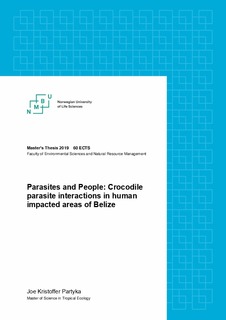| dc.description.abstract | Despite the recorded cases of crocodilian epidemic mortalities caused by human disturbance of the environment, there still remains a lack of information to understand how anthropogenic disturbances affect crocodilian health. This study is the first study to investigate the innate immune function, health and parasitism of the American crocodile (Crocodylus acutus) and Morelet’s crocodile (Crocodylus moreletii) in response to human presence and disturbance. More specifically, it focuses on the relationship between the crocodiles and their parasites from various habitats within developed and rural landscapes in Belize. The investigation also examined the host’s health response to haemoparasite load, as well as to the presence of the ectoparasite Paratrichosoma sp. Parasite load and presence was used to investigate how parasites affect crocodilian health through hematological analysis. These effects were also investigated in connection to human disturbance. All (100%) blood samples contained haemoparasites. In fact, this is the first study to record such a high haemoparasite infection rate in crocodilians, as well as the first study to report the presence of a haemoparasite in Morelet’s crocodile (Crocodylus moreletii). However, results indicate that the haemoparasites found in C. acutus and C. moreletii do not appear to have an adverse effect on the crocodiles, as they did not affect body condition or correlate with a parasite-specific immune response. Across the two species, 34.5% of all sampled individuals showed traces of infection by the ectoparasitic nematode Paratrichosoma sp. and the presence of the parasite did not differ between sites, species, salinity or pH. Similarly, the presence of Paratrichosoma sp. was not found to correlate with body condition, white blood cell recruitment or eosinophil recruitment, and lends more evidence to the notion that this is a benign parasite in crocodilians. Haemoparasite load and the presence of haemoparasites or skin parasites did not differ between site classes, sex or species in Belize. There was, however, a significant lower body condition detected among C. acutus who inhabited human developed areas compared to C. moreletii who were more commonly encountered in rural areas. There was also a correlation between lower body condition and areas of high anthropogenic disturbance and with increased salinity. This suggest that the lowered body condition in American crocodiles may be related to an unidentified anthropogenic stressor. This investigation uncovered several novel results within the crocodilian research community, nevertheless there is still a need for further studies investigating parasites, immunology, and human disturbance effects in crocodilians. | nb_NO |

